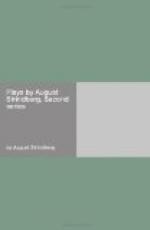MAURICE. But why did the punishment have to be so hard when I was innocent?
ABBE. Hard? Only two days! And you were not innocent. For we have to stand responsible for our thoughts and words and desires also. And in your thought you became a murderer when your evil self wished the life out of your child.
MAURICE. You are right. But my decision is made. To-night I will meet you at the church in order to have a reckoning with myself— but to-morrow evening I go to the theatre.
MME. CATHERINE. A good solution, Monsieur Maurice.
ADOLPHE. Yes, that is the solution. Whew!
ABBE. Yes, so it is!
(Curtain.)
MISS JULIA
INTRODUCTION
The volume containing the translation of “There Are Crimes and Crimes” had barely reached the public when word came across the ocean that August Strindberg had ended his long fight with life. His family had long suspected some serious organic trouble. Early in the year, when lie had just recovered from an illness of temporary character, their worst fears became confirmed. An examination disclosed a case of cancer in the stomach, and the disease progressed so rapidly that soon all hope of recovery was out of the question. On May 14, 1912, Strindberg died.
With his death peace came in more senses than one. All the fear and hatred which he had incurred by what was best as well as worst in him seemed to be laid at rest with his own worn-out body. The love and the admiration which he had son in far greater measure were granted unchecked expression. His burial, otherwise as simple as he himself had prescribed, was a truly national event. At the grave of the arch-rebel appeared a royal prince as official representative of the reigning house, the entire cabinet, and numerous members of the Riksdag. Thousands of men and women representing the best of Sweden’s intellectual and artistic life went to the cemetery, though the hour of the funeral was eight o’clock in the morning. It was an event in which the masses and the classes shared a common sorrow, the standards of student organizations mingling with the banners of labour unions. And not only the capital, but the whole country, observed the day as one of mourning.
A thought frequently recurring in the comment passed on Strindberg’s death by the European press was that, in some mysterious manner, he, more than any other writer, appeared to be the incarnation of the past century, with its nervous striving after truth, its fear of being duped, and its fretting dread that evolution and progress might prove antagonistic terms. And at that simple grave in Stockholm more than one bareheaded spectator must have heard the gravel rattle on the coffin-lid with a feeling that not only a great individual, but a whole human period—great in spite of all its weaknesses—was being laid away for ever.




